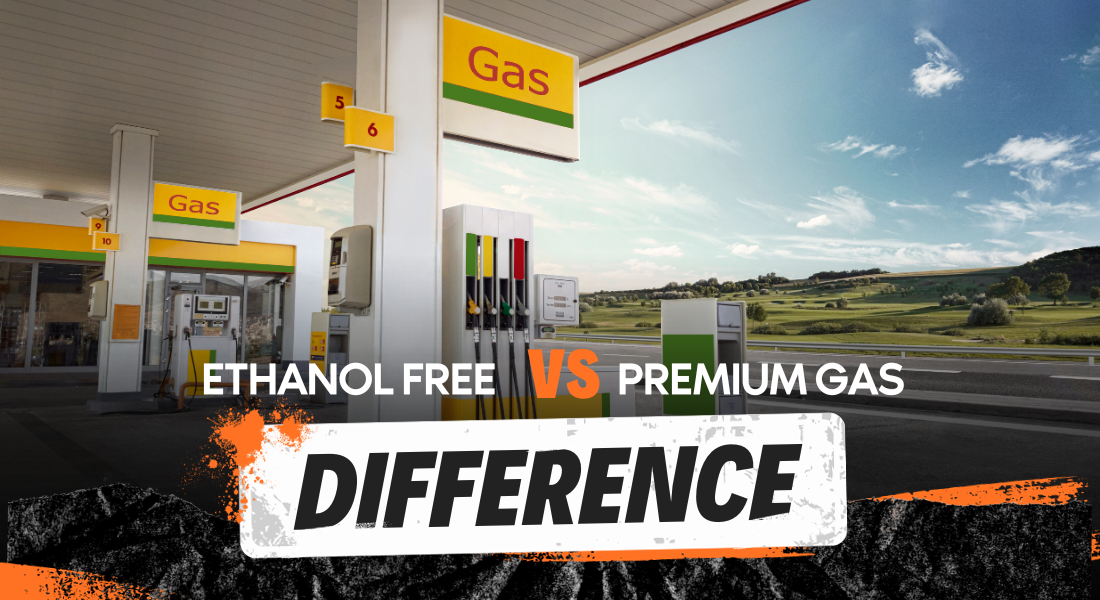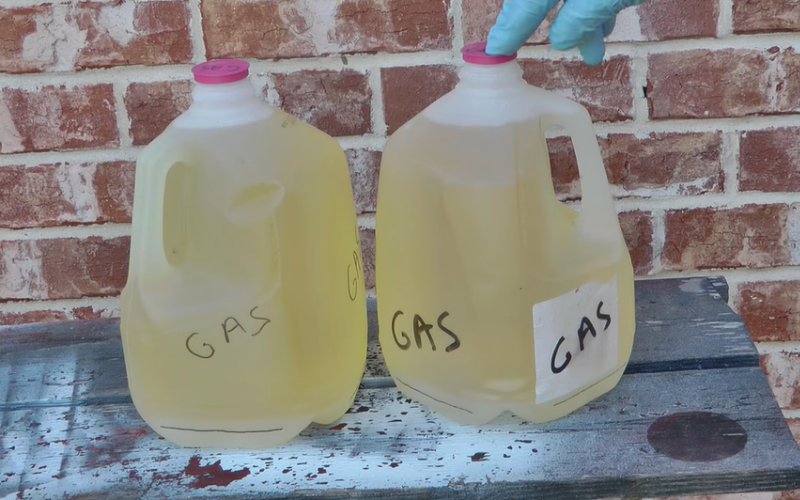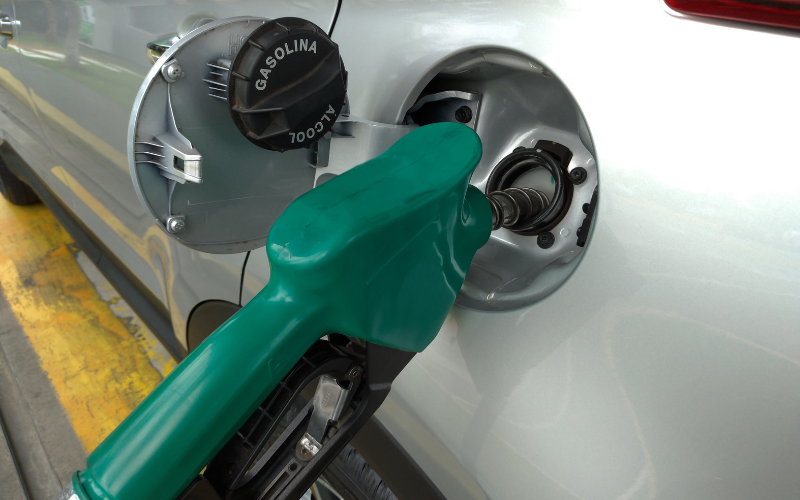Ethanol Free Gas Vs Premium: What is The Difference?
When we stop at the gas station, there are usually 3 or 4 gasoline grades available. Each grade is priced differently, so which one should we use? Often, we discuss the benefits of Ethanol Free and Premium Gas, but does it really make a difference for your car?
Usually, you see premium fuels at petrol stations, which are more expensive than regular petrol & diesel. Ethanol-free gas, also called pure oil, can be used as an alternative to petrol mixed with ethanol. Despite its name, premium gasoline is of the highest quality.
However, how do Ethanol Free Gas Vs Premium gas differ from one another? This guide attempts to explain all issues with the advantages and disadvantages of using both.

Ethanol Free Gas Vs Premium: Characteristics Briefly
| Ethanol Free Gas | Premium Gas |
| Gas mileage has improved by around 3 to 4 percent. | It is called high octane gas due to its 91 to 94 octane rating. |
| Expected engine life is longer when using ethanol. | Oil mixed with ethanol is reported to have a lower fuel efficiency. |
| Due to the fact that small engines aren’t designed to run on ethanol-based gas. | Premium gas is more fuel-efficient, & potent, resulting in higher gas mileage and a decrease in emissions. |
| Not recommended for newer engines with high compression ratios. | In vehicles with higher compression ratios, luckily premium gas enhances your vehicle’s gas mileage. |
| Ethanol Free Gas is a cheaper option than others. | Premium fuel is more expensive than standard gas. |
Ethanol Free Gas Vs Premium: In-Depth Discussion
Ethanol Free Gas: What Is It?

Corn is used as the raw material for ethanol, and it has been made since 1908. In fact, it was ethanol that powered the 1st Model T. Prior to that, ethanol was used as a component of moonshine, so it’s not a new concept. Recently, many consumers have requested fuel without ethanol.
Prior to 2003, Methyl tert butyl ether (MTBE) was an oxygenating fuel additive. The substance was replaced with ethanol. Nowadays, due to state and federal laws, public gas stations dispense mostly ethanol fuel.
Premium Gas: What Is It?

The purpose of premium fuel is to improve the performance of vehicles that have high compression ratios. As the pistons in these vehicles go deeper into the engine, high octane fuel will be beneficial to performance & efficiency. Fuel’s octane indicates the amount of compression it can undergo before igniting. Whenever gasoline ignites, especially through compression rather than spark plugs, knocking may occur.
In vehicles with a high compression ratio, using premium gas will prevent knocking and damage to the engine.
Features Of Ethanol Free Gas
- Energy content is higher. More energy equals more power.
- Ethanol is far less harmful to engines because it attracts water, preventing the rusting of engine components.
- Adding ethanol to a vehicle’s carburetor could lead to vapor lock as a result of increased vapor pressure.
- The engine is not corroded by ethanol. It is cheaper to produce than gasoline.
- Ethanol crops are not needed to improve gas mileage. Fewer fossil fuels are used and preferably for older automobiles.
- Due to the fact that small engines aren’t designed to run on ethanol-based gas, this should be used for outdoor equipment.
- Saves you money on outdoor equipment repairs.
Features Of Premium Gas
- With premium gas, turbochargers and high-compression engines have less engine knock, enabling smooth acceleration.
- However, premium gas may boost engine performance, but it isn’t more efficient.
- Increased fuel efficiency is a function of engine performance, not gasoline quality.
- Gas stations won’t stop serving you if you buy premium gas, especially if your car is not designed to run on premium gasoline.
- When you buy premium gasoline, the detergents are stronger.
- Still, you need to service your vehicle professionally to ensure a clean fuel system.
Advantages and Disadvantages Of Ethanol Free Gas

When a gas station advertises that they sell ‘Ethanol-free Oil’ or ‘Pure Oil’, what does it mean? Moreover, why do consumers disagree about which fuel is the best; is it pure ethanol, pure oil, or E10 (fossil fuel)? In recent years, there has been an ongoing debate over whether gas-containing ethanol or ethanol pure is truly superior to pure oil based on a variety of factors.
Following are a few of the pros & cons mentioned in such discussions about using ethanol free gasoline.
Pros of Ethanol Free Gas:
- Pure gasoline with a high energy content is more powerful, so it produces more power.
- The engine can generate greater kinetic energy as it burns less fuel, allowing you to apply less fuel while getting more mileage.
- It’s harmful to engines that run on ethanol-mixed fuel, especially older models because they weren’t built to handle it.
- Some problems have been reported, including leaks from worn rubber seals & a possible vapor lock in the carburetor due to increased vapor pressure.
- Following the addition of ethanol to gasoline in the United States, corn was grown more widely, leading to higher prices for corn & its products.
- By using pure fuel more frequently, the demand for ethanol crops will decline, reducing the overall cost of corn.
Cons Of Ethanol Free Gas:
- Pure oil is known to have higher harmful emissions, which contribute to pollution and global warming. The result is more dependence on foreign oil.
- Ethanol Free Gas is not recommended for newer engines with high compression ratios.
- The octane rating of regular gasoline is lower than that of ethanol. Thus it’s not suitable for this type of engine.
Advantages And Disadvantages Of Premium Gas
In your cylinders, carbon deposits accumulate over time. In this way, your vehicle’s combustion ratio will be higher, resulting in a higher octane rating. Older vehicles will be particularly affected by this phenomenon. When this happens, premium gas is a great option to help prolong the vehicle’s life.
Following are a few of the pros & cons mentioned in such discussions about using premium gasoline.
Pros of Premium Gas:
- In addition, premium fuel can help reduce engine knocking. When the piston is dropped into your cylinder, gasoline and air are compressed, and then a spark is ignited.
- Knocks are caused when fuel ignites without the assistance of a spark plug.
- A fuel explosion unregulated can cause significant vehicle damage, which is why higher-octane fuels should be used.
- While premium gas costs more, vehicles that require premium will gain less fuel efficiency by switching to regular.
- It’s possible that you’ll be spending more on fuel over time since your vehicle uses more fuel compared to usual.
- You can find out how well your car performs by using this higher octane fuel. In contrast, using regular gasoline will result in diminished performance.
- The switch won’t allow you to reach your original horsepower. Despite the vehicle’s performance, it’ll be somewhat slower than when it uses premium gasoline.
Cons of Premium Gas:
- In general, premium fuel is only necessary for one type of vehicle, namely petrol engines that are highly compressed.
- According to car manufacturers, premium diesel fuel is not necessary for diesel vehicles.
- There is no physical evidence that premium fuel has any benefits.
Ethanol Free Gas Vs Premium: What To Buy?
Ethanol Free Gas Vs Premium Gas differ in their octane rating. According to most states, ethanol-free gasoline is rated 87 octane, as opposed to premium gasoline, which is rated 91 to 93.
Premium gas has a higher octane rating, which reduces the risk of engine knock, the result of an engine combusting too early on its fuel and air mixture. When driving a car with a high compression engine, boosted engine performance may be enhanced by the presence of a higher knock level.
FAQs.
Does ethanol-free gas offer more value than premium?
Despite the fact that 3% may not seem like much, it can accumulate over time. If you compare non-ethanol gas to regular & premium gas, ethanol-free gas gives you better mileage.
Is premium gas more fuel-efficient?
When you use premium gas in luxury & performance vehicles that use turbochargers and high compression, you will get the maximum horsepower. Aside from that, premium gas improves fuel efficiency, resulting in longer gas mileage and lower emissions.
What is the benefit of ethanol-free gas to engines?
While ethanol-blended gas is more popular, it may be better to use pure gas in older cars, lawn mowers, boats, and other equipment. Fuel-efficient gasoline is also available without ethanol. However, most drivers go with the E10 and E15 blends, which contain 15% to 20% ethanol. The ethanol slightly reduces fuel economy by about 5%.
The Bottom Line
If you want to make the right investment decision, put together a pros & cons list. If you’re purchasing a new car or smartphone, be sure you get the best value for your money. Ethanol Free Gas Vs Premium: Which Should You Choose? Regular and premium gas both contain detergents capable of reducing carbon deposits in a certain way.
This topic of fuel economy can be confusing, so I hope my explanation was helpful. In case of doubt, you should follow your owner’s manual’s octane recommendations. In addition, for better gas mileage, you should drive well & service your vehicle regularly, especially if something doesn’t seem right.
- Read Also>> Who Makes Kawasaki Oil Filters & Where It Is Made?
- Read Also>> Liqui Moly Vs Mobil 1: How Do They Differ & Which Is Better?
- Read Also>> Marvel Mystery Oil Problems? Unravel the real mystery behind it
- Read Also>> Lucas Oil Stabilizer Review: Should You Use It?(Explained)
- Read Also>> Pennzoil Vs. Valvoline: What Is Difference & Similarities
